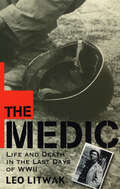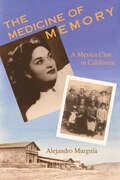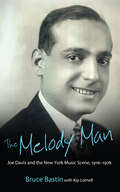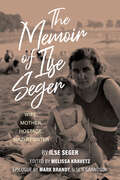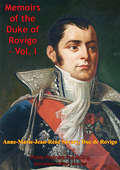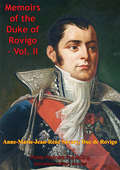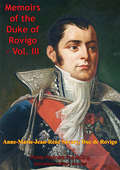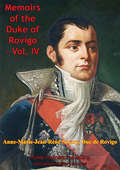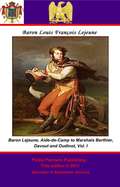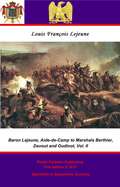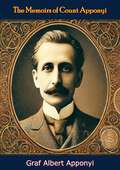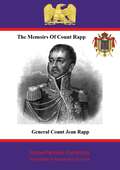- Table View
- List View
The Medic: Life and Death in the Last Days of WWII
by Leo LitwakLeo Litwak was a university student when he joined the Army to fight in World War II, "a na've, callow eighteen-year-old son prepared to join other soldier boys being hauled off to war." In 1944 he found himself in Belgium, in the middle of the waning European war, a medic trained to save lives but often powerless to do much more than watch life slip away. It was hard fighting that took Litwak and his rifle company into the heart of Germany at the close of the war. But Litwak learned there was more to war than fighting, more to understand than maps and ammunition. In the final months of the war, he watched the men in his company tenderly serve food at a Passover seder for a dozen brutalized Jewish women newly liberated from slavery. He watched those same men torture and execute defenseless German soldiers. He fell in love at the Moulin Rouge in a scene straight out of a Toulouse-Lautrec painting. The men in his company were dreamers, thieves, friends, killers, revolutionaries, and heroes. They were the men of their time: sometimes brave, sometimes compassionate, sometimes cruel, sometimes loving, usually scared. They were held together by loyalty, only to be scattered by the war's end. The Medic is the gritty, wise, bighearted, and unflinching account of one man's quest to find sense in war and its aftermath.
The Medicean Succession
by Gregory MurryIn 1537, Florentine Duke Alessandro dei Medici was murdered by his cousin and would-be successor, Lorenzino dei Medici. Lorenzino's treachery forced him into exile, however, and the Florentine senate accepted a compromise candidate, seventeen-year-old Cosimo dei Medici. The senate hoped Cosimo would act as figurehead, leaving the senate to manage political affairs. But Cosimo never acted as a puppet. Instead, by the time of his death in 1574, he had stabilized ducal finances, secured his borders while doubling his territory, attracted an array of scholars and artists to his court, academy, and universities, and, most importantly, dissipated the perennially fractious politics of Florentine life. Gregory Murry argues that these triumphs were far from a foregone conclusion. Drawing on a wide variety of archival and published sources, he examines how Cosimo and his propagandists successfully crafted an image of Cosimo as a legitimate sacral monarch. Murry posits that both the propaganda and practice of sacral monarchy in Cosimo's Florence channeled preexisting local religious assumptions as a way to establish continuities with the city's republican and renaissance past. In "The Medicean Succession," Murry elucidates the models of sacral monarchy that Cosimo chose to utilize as he deftly balanced his ambition with the political sensitivities arising from existing religious and secular traditions.
The Medicine of Memory: A Mexica Clan in California
by Alejandro MurguíaAn American Book Award winner&’s creative memoir &“traces his own family's history, as well as the long story of Hispanics in America . . . Spirited writing&” (Library Journal). People who live in California deny the past, asserts Alejandro Murguía. In a state where what matters is keeping up with the current trends, fads, or latest computer gizmo, no one has the time, energy, or desire to reflect on what happened last week, much less what happened ten years ago, or a hundred. From this oblivion of memory, he continues, comes a false sense of history, a deluded belief that the way things are now is the way they have always been. In this work of creative nonfiction, Murguía draws on memories—his own and his family&’s reaching back to the eighteenth century—to (re)construct the forgotten Chicano-indigenous history of California. He tells the story through significant moments in California history, including the birth of the mestizo in Mexico, destruction of Indian lifeways under the mission system, violence toward Mexicanos during the Gold Rush, Chicano farm life in the early twentieth century, the Chicano Movement of the 1960s, Chicano-Latino activism in San Francisco in the 1970s, and the current rebirth of Chicano-Indio culture. Rejecting the notion that history is always written by the victors, and refusing to be one of the vanquished, he records, and draws us into, his own California history.
The Medieval Python: The Purposive and Provocative Work of Terry Jones (The New Middle Ages)
by R. F. Yeager Toshiyuki TakamiyaThis is a collection of essays by diverse hands engaging, interrogating, and honoring the medieval scholarship of Terry Jones. Jones' life-long engagement with the Middle Ages in general, and with the work of Chaucer in particular, has significantly influenced contemporary understanding of the period generally, and Middle English letters in particular. Both in film of all types - full-feature comedy (Monty Python and the Holy Grail) as well as educational television series for BBC, the History Channel, etc. (e.g., Medieval Lives) - and in his published scholarship (e.g., Chaucer's Knight, in original and revised editions, Who Murdered Chaucer?), Jones has applied his unique combination of carefully researched scholarship, keen intelligence, fearless skepticism of establishment thinking, and his broad good humor to challenge, enlighten and reform. No one working today in either Middle English studies or in period-related film and/or documentary can proceed untouched by Jones' purposive, provocative views. Jones, perhaps more than any other medievalist, can be said to be an integral part of what Palgrave deems the "common dialogue."
The Medium Next Door: Adventures of a Real-Life Ghost Whisperer
by Maureen HancockThe Medium Next Door is the amazing life story of spirit medium Maureen Hancock, who discovered her psychic abilities to see, hear, and speak with the dead when she was just five years old. Descended from a long line of legendary Irish mystics, Maureen was no stranger to the spiritual realm, but she still kept the messages from the departed to herself all throughout her childhood and teen years, eventually suppressing them almost completely.Maureen wouldn't open herself up to communicating with spirits again until she was in a near-fatal car crash. Soon after, she had hundreds of voices in her head, many of them helping her crack cases and expose fraud in her role as a litigation paralegal at a large Boston law firm. Accepting her gift but still keeping it to herself, she married and had two children.It wasn't until tragedy struck on 9/11 and Maureen was bombarded with messages from the spirits that she realized she had to stop hiding her ability and put it to good use. She left her job at the law firm and opened the holistic healing center Pathways to Healing and launched the cancer foundation Manifest a Miracle. Today, she goes by the title Medium Mom and strives to balance raising children, raising the dead, assisting the dying, searching for missing children, and teaching about life after death.
The Meerkats Of Summer Farm: The True Story of Two Orphaned Meerkats and the Family Who Saved Them
by Jayne CollierThe Colliers are a pretty normal family: mum, dad, two kids, two dogs and two cats ... Oh, and a few wallabies, two lemurs, several owls, Ringo the bad-tempered crane and two cheeky, hand-reared meerkats named Wren and Rascal.THE MEERKATS OF SUMMER FARM is the remarkable story of a year at Axe Valley Bird and Animal Park, following the birth of the adorable young kits. In her charming and often hilarious memoir, Jayne Collier describes how these two playful and ever-curious creatures became the park's star attraction and - in spite of permanent damage to her kitchen floor and occasional (subterranean) breaks for freedom - found a permanent place in the family's heart.
The Meerkats of Summer Farm: The True Story of Two Orphaned Meerkats and the Family Who Saved Them
by Jayne CollierThe Colliers are a pretty normal family: mum, dad, two kids, two dogs and two cats ... Oh, and a few wallabies, two lemurs, several owls, Ringo the bad-tempered crane and two cheeky, hand-reared meerkats named Wren and Rascal.THE MEERKATS OF SUMMER FARM is the remarkable story of a year at Axe Valley Bird and Animal Park, following the birth of the adorable young kits. In her charming and often hilarious memoir, Jayne Collier describes how these two playful and ever-curious creatures became the park's star attraction and - in spite of permanent damage to her kitchen floor and occasional (subterranean) breaks for freedom - found a permanent place in the family's heart.
The Melody Man: Joe Davis and the New York Music Scene, 1916-1978 (American Made Music Series)
by Bruce BastinJoe Davis (1896–1978), the focus of The Melody Man, enjoyed a fifty-year career in the music industry, which covered nearly every aspect of the business. He hustled sheet music in the 1920s; copyrighted compositions by artists as diverse as Fats Waller, Carson Robison, Otis Blackwell, and Rudy Vallee; oversaw hundreds of recording sessions; and operated several record companies beginning in the 1940s. Davis also worked fearlessly to help ensure that black recording artists and song writers gained equal treatment for their work.Much more than a biography, this book is an investigation of the role played by music publishers during much of the twentieth century. Joe Davis was not a music “great,” but he was one of those individuals who enabled “greats” to emerge. A musician, manager, and publisher, his long career reveals much about the nature of the music industry and offers insight into how the industry changed from the 1920s to the 1970s. By the summer of 1924, when Davis was handling the “race talent” for Ajax records, he had already worked in the music business for most of a decade, and there were more than five decades of musical career ahead of him. The fact that his fascinating life has gone so long underappreciated is remedied by the publication of this book.Originally published in England in 1990 as Never Sell a Copyright: Joe Davis and His Role in the New York Music Scene, 1916–1978, this book was never released in the United States and only made available in a very limited print run in England. The author, noted blues scholar and folklorist Bruce Bastin, has worked with fellow music scholar Kip Lornell to completely update, condense, and improve the book for this first-ever American edition.
The Melon Capital of the World: A Memoir
by Blake AllmendingerIn this psychologically gripping memoir, Blake Allmendinger returns to his childhood home after a forty-year absence. His homecoming to the struggling farming community of Rocky Ford, Colorado, formerly known as the Melon Capital of the World, forces the author to confront his own sad and disturbing history, one that parallels his hometown’s decline.Allmendinger’s family was dominated by his emotionally and mentally unstable mother, who became depressed while living in Rocky Ford as a young woman. For the rest of her life she abused the members of her family, creating tensions that remained unresolved until the end of the author’s visit, when his mother died suddenly, a family member committed suicide, and a secret diary was discovered.The Melon Capital of the World is a remarkable blend of personal narrative, memoir, and Allmendinger’s interviews with people who knew his mother and her family. His story is a gritty but compassionate, and at times humorous, portrait of a family trying to survive in the rapidly disappearing rural American West.
The Memoir of Ilse Seger: Wife, Mother, Hostage, Nazi Resister
by Ilse SegerElisabeth "Ilse" Seger was the wife of Gerhart Heinrich Seger, a German Social Democratic member of the Reichstag from 1930 to 1933. He was reelected for the last time on March 5, 1933, shortly after Hitler came to power. A week later, the Nazis arrested him and held him in "protective custody" for three months in a local prison in Dessau and then sent him to Oranienburg concentration camp for six months, until he escaped to Czechoslovakia. In The Memoir of Ilse Seger, Ilse tells Gerhart's story, but more importantly, she tells her own story: of her early resistance to the Nazi regime as a political opponent herself; of her solidarity with the Jews during the early years of Nazi persecution; of her defiance of expectations for women at the time; of her time as a hostage alongside her daughter, Renate, in Rosslau concentration camp and how they got out with help from members of Parliament; and, lastly, of her first years living in exile in France and Switzerland as her husband went on an anti-fascist speaking tour in the US. Ilse's story is an incredible contribution to our understanding of gendered political resistance, life in early German concentration camps, and Alltagsgeschichte, or the history of everyday life, by showing what everyday life was like for the wife of a political opponent in Nazi Germany.The Memoir of Ilse Seger is a gripping narrative of adventure and intrigue about the wartime life of an ordinary, decent woman.
The Memoirs Of Duke Of Rovigo Vol. I (The Memoirs of Duke of Rovigo #1)
by Anne Jean Marie René Savary Duke of RovigoAs the tide of the French revolution swept away the noble privileges many of high birth fled the country, some officers stayed despite the danger of the revolutionaries, including both Napoleon and Anne-Jean-Marie-René Savary, loyal to the state and sniffing advancement. Savary enlisted as a volunteer and was posted to the Armies of the Sambre and Meuse rivers and then the Rhine, his distinguished services led him to selected as an aide-de-camp of General Desaix who was known as a shrewd judge of characters both of men and of soldiers. It was in the sands of the desert during the Egyptian Campaign in 1798 that Savary met Napoleon he would serve faithfully for the next 17 years in the almost unbroken conflict that scarred Europe. He served admirably with his old commander Desaix during the Italian Campaign in 1800, after Desaix fell at the battle of Marengo Napoleon decided to take Savary into his confidence and appointed him head of his bodyguard. Promoted to Général de Division in 1805 shortly before the Austerlitz campaign. Once again he displayed great gallantry and courage during the fighting, but Napoleon saw that his abilities were also of use away from the field, and started to use him as a diplomat upon who he could always rely. After further missions, particularly in intrigues in Spain, Savary was appointed Minister of Police in 1810, he discharged his duties with a zeal that would not have been out of place in the Spanish Inquisition but was at fault during the attempted coup d'état of General Malet in 1812 whilst the Grande Armée was struggling through the snows of Russia. He served on as a faithful servant of Napoleon until the bitter end after Waterloo in 1815, and was considered dangerous enough to be refused permission to go the Elba with his former master. The First Volume includes his early years in the army, Egypt, the Italian campaign, treasons of Moreau and Pichegru, the 1805 Austerlitz Campaign and the Jena campaign 1806.
The Memoirs Of Duke Of Rovigo Vol. II (The Memoirs of Duke of Rovigo #2)
by Anne Jean Marie René Savary Duke of RovigoAs the tide of the French revolution swept away the noble privileges many of high birth fled the country, some officers stayed despite the danger of the revolutionaries, including both Napoleon and Anne-Jean-Marie-René Savary, loyal to the state and sniffing advancement. Savary enlisted as a volunteer and was posted to the Armies of the Sambre and Meuse rivers and then the Rhine, his distinguished services led him to selected as an aide-de-camp of General Desaix who was known as a shrewd judge of characters both of men and of soldiers. It was in the sands of the desert during the Egyptian Campaign in 1798 that Savary met Napoleon he would serve faithfully for the next 17 years in the almost unbroken conflict that scarred Europe. He served admirably with his old commander Desaix during the Italian Campaign in 1800, after Desaix fell at the battle of Marengo Napoleon decided to take Savary into his confidence and appointed him head of his bodyguard. Promoted to Général de Division in 1805 shortly before the Austerlitz campaign. Once again he displayed great gallantry and courage during the fighting, but Napoleon saw that his abilities were also of use away from the field, and started to use him as a diplomat upon who he could always rely. After further missions, particularly in intrigues in Spain, Savary was appointed Minister of Police in 1810, he discharged his duties with a zeal that would not have been out of place in the Spanish Inquisition but was at fault during the attempted coup d'état of General Malet in 1812 whilst the Grande Armée was struggling through the snows of Russia. He served on as a faithful servant of Napoleon until the bitter end after Waterloo in 1815, and was considered dangerous enough to be refused permission to go the Elba with his former master. The Second Volume resumes with the 1807 campaign in Prussia, the invasion of Spain 1808, the 1809 campaign in Austria, the Peninsular War and his appointment to the Ministry of Police.
The Memoirs Of Duke Of Rovigo Vol. III (The Memoirs of Duke of Rovigo #3)
by Anne Jean Marie René Savary Duke of RovigoAs the tide of the French revolution swept away the noble privileges many of high birth fled the country, some officers stayed despite the danger of the revolutionaries, including both Napoleon and Anne-Jean-Marie-René Savary, loyal to the state and sniffing advancement. Savary enlisted as a volunteer and was posted to the Armies of the Sambre and Meuse rivers and then the Rhine, his distinguished services led him to selected as an aide-de-camp of General Desaix who was known as a shrewd judge of characters both of men and of soldiers. It was in the sands of the desert during the Egyptian Campaign in 1798 that Savary met Napoleon he would serve faithfully for the next 17 years in the almost unbroken conflict that scarred Europe. He served admirably with his old commander Desaix during the Italian Campaign in 1800, after Desaix fell at the battle of Marengo Napoleon decided to take Savary into his confidence and appointed him head of his bodyguard. Promoted to Général de Division in 1805 shortly before the Austerlitz campaign. Once again he displayed great gallantry and courage during the fighting, but Napoleon saw that his abilities were also of use away from the field, and started to use him as a diplomat upon who he could always rely. After further missions, particularly in intrigues in Spain, Savary was appointed Minister of Police in 1810, he discharged his duties with a zeal that would not have been out of place in the Spanish Inquisition but was at fault during the attempted coup d'état of General Malet in 1812 whilst the Grande Armée was struggling through the snows of Russia. He served on as a faithful servant of Napoleon until the bitter end after Waterloo in 1815, and was considered dangerous enough to be refused permission to go the Elba with his former master.The Third Volume continues with his service in the Ministry of Police, the continuing Peninsular War, the coup d'état of General Malet and the retreat of the French Army in 1813-1814.
The Memoirs Of Duke Of Rovigo Vol. IV (The Memoirs of Duke of Rovigo #4)
by Anne Jean Marie René Savary Duke of RovigoAs the tide of the French revolution swept away the noble privileges many of high birth fled the country, some officers stayed despite the danger of the revolutionaries, including both Napoleon and Anne-Jean-Marie-René Savary, loyal to the state and sniffing advancement. Savary enlisted as a volunteer and was posted to the Armies of the Sambre and Meuse rivers and then the Rhine, his distinguished services led him to selected as an aide-de-camp of General Desaix who was known as a shrewd judge of characters both of men and of soldiers. It was in the sands of the desert during the Egyptian Campaign in 1798 that Savary met Napoleon he would serve faithfully for the next 17 years in the almost unbroken conflict that scarred Europe. He served admirably with his old commander Desaix during the Italian Campaign in 1800, after Desaix fell at the battle of Marengo Napoleon decided to take Savary into his confidence and appointed him head of his bodyguard. Promoted to Général de Division in 1805 shortly before the Austerlitz campaign. Once again he displayed great gallantry and courage during the fighting, but Napoleon saw that his abilities were also of use away from the field, and started to use him as a diplomat upon who he could always rely. After further missions, particularly in intrigues in Spain, Savary was appointed Minister of Police in 1810, he discharged his duties with a zeal that would not have been out of place in the Spanish Inquisition but was at fault during the attempted coup d'état of General Malet in 1812 whilst the Grande Armée was struggling through the snows of Russia. He served on as a faithful servant of Napoleon until the bitter end after Waterloo in 1815, and was considered dangerous enough to be refused permission to go the Elba with his former master.The Fourth and concluding volume covers the fall of Paris in 1814 and Napoleon's first abdication, the Hundred Days campaign and Napoleon's final fall from power in 1815.
The Memoirs of Baron Lejeune, Aide-de-Camp to Marshals Berthier, Davout and Oudinot. Vol. I (The Memoirs of Baron Lejeune, Aide-de-Camp to Marshals Berthier, Davout and Oudinot. #1)
by Pickle Partners Publishing Mrs Arthur Bell Général de Brigade, Baron Louis-François Lejeune Major-General Sir John Frederick MauriceThis ebook is purpose built and is proof-read and re-type set from the original to provide an outstanding experience of reflowing text for an ebook reader. Amongst the many memoirs of the Napoleonic period, there are a number that stand out not just for their historical value, but also for their actual written style; however, in this sense Lejeune stands alone. He was by nature an artist and is still famous as a noted painter of scenes of battles, most of which he witnessed. As such his scenes are like his paintings, filled with evocative detail. The narrative in Vol. I runs from his earliest recollections of a chance encounter with Marie Antoinette to his joining the republican movement and a battalion of national volunteers. As the consulate dawns, we find him as an aide-de-camp with the army of reserve in 1800 and fought at the battle of Marengo. He was present at the battles of Austerlitz, Jena, Eylau, Friedland, Landshut, Eckmühl, Aspern-Essling and Wagram. A substantial part of this volume revolves around the vicious and protracted second siege of Saragossa, which even in the Peninsular War stands out for the courage and fierceness of both sides. His treatment of the siege and the forces engaged is the best of its genre by some distance. Lejeune was witness to some of the great events of the Napoleonic period, and moved with the grace of a courtier through them, his eye catches the human actors in his pen portraits beautifully. Highly Recommended. Includes Linked TOC Text taken from book published by Longmans, Green and Co, London 1897 Author: Général de Brigade Baron Louis Franc ois Lejeune, (1775-1848;) Translator: Mrs Arthur Bell [D'Anvers, N.],( ????-1933 ) Foreword: Major-General Maurice, John Frederick, Sir, 1841-1912 Annotations - Pickle Partners Publishing
The Memoirs of Baron Lejeune, Aide-de-Camp to Marshals Berthier, Davout and Oudinot. Vol. II (The Memoirs of Baron Lejeune, Aide-de-Camp to Marshals Berthier, Davout and Oudinot. #2)
by Pickle Partners Publishing Mrs Arthur Bell Général de Brigade, Baron Louis-François LejeuneThis ebook is purpose built and is proof-read and re-type set from the original to provide an outstanding experience of reflowing text for an ebook reader. Amongst the many memoirs of the Napoleonic period, there are a number that stand out not just for their historical value, but also for their actual written style, however in this sense Lejeune stands alone. Lejeune was by nature an artist and is still a famous as a noted painter of scenes of battles, most of which he witnessed. As such his scenes are like his painting filled with evocative detail. The narrative in Vol. II runs from the Napoleon's divorce of the Empress Josephine and his subsequent marriage to Marie-Louise of Austria with the attendant balls and festivities. As the war in Spain drags on, he is sent on an important mission to collect information for the Emperor, during which he is ambushed and captured by partisans. His subsequent imprisonment and transfer to Britain are painted in vivid colours and are surpassed only by his subsequent escape to France and evasion of the dread smuggler "Brick". Lejeune was on the staff of Marshal Berthier and, thereafter Marshal Davout, during the Russian campaign of 1812, and was witness to the bloody struggle to Moscow and the disastrous retreat back to Prussia. His numerous vignettes of the retreat are often quoted due to their detail and incisive nature, his description of his purchase of a bearskin from its unwilling seller, a colonel swaddled in furs, on the retreat is priceless. Lejeune also served on in the twilight of the Empire, at the battles of Lützen, Bautzen, and Leipzig. His military career was ended by wounds from a shell fragment the day after the battle of Hanau in 1813. Lejeune was witness to some of the great events of the Napoleonic period, and moved with the grace of a courtier through them, his eye catches the human actors in his pen portraits beautifully. Highly Recommended. Includes Linked TOC Text taken from book published in 1897, Longmans, Green and Co, London Author: Général de Brigade Baron Louis Franc ois Lejeune, (1775-1848;) Translator: Mrs Arthur Bell [D'Anvers, N.], ????-1933 Foreword: Major-General Maurice, John Frederick, Sir, 1841-1912 Annotations - Pickle Partners Publishing
The Memoirs of Baron de Marbot - late Lieutenant General in the French Army. Vol. I (The Memoirs of Baron de Marbot - late Lieutenant General in the French Army #1)
by Arthur John Butler Pickle Partners Publishing Général de Division, Baron Jean Baptiste Antoine Marcelin de MarbotThis ebook is purpose built and is proof-read and re-type set from the original to provide an outstanding experience of reflowing text for an ebook reader. Perhaps the most famous of all Napoleonic memoirs to be written in any language are those written by Marbot. They stand in a league of their own. Napoleon, himself left a donation of 100,000 to him, for his refutation of General Rogniat's work - to quote Napoleon's will "I recommend him to continue to write in defense of the glory of the French armies, and to confound their calumniators and apostates." So entertaining and full of vivid details that Sir Arthur Conan Doyle fictionalized them into his adventures of Brigadier Gerard. In this the first volume of his translated memoirs, it covers his early childhood, born into a military family, to his first steps on the military ladder as a hussar in the 1e Regiment de Hussards (ex-Bercheny). His dash and leadership lead to a commission and appointments on the staff of Generals Augereau and Masséna. He writes poignantly of his fathers death at the siege of Genoa (1800) and the privations suffered in the city by the defenders and the inhabitants alike. His career takes him to the battles of Austerlitz, Friedland, Eylau and Aspern-Essling. His narrative is full of anecdotes and vignettes of the great and the good of the Consulate and Empire, he portrays himself in the midst of such luminaries as the Emperor, his Marshals and Generals. Contains portrait of de Marbot from 1812 as a colonel of 23e Hussards, and maps illustrating the 1805, 1806 and 1809 battles. The text and maps are taken from the 1892 publishing by Longmans, Green and Co, London and New York. Author - Jean Baptiste Antoine Marcelin, Baron de Marbot, 1782-1854 Translator - Arthur John Butler 1844-1910
The Memoirs of Baron de Marbot - late Lieutenant General in the French Army. Vol. II (The Memoirs of Baron de Marbot - late Lieutenant General in the French Army #2)
by Arthur John Butler Pickle Partners Publishing Général de Division, Baron Jean Baptiste Antoine Marcelin de MarbotThis ebook is purpose built and is proof-read and re-type set from the original to provide an outstanding experience of reflowing text for an ebook reader. Perhaps the most famous of all Napoleonic memoirs to be written in any language are those written by Marbot. They stand in a league of their own. Napoleon, himself left a donation of 100,000 to him, for his refutation of General Rogniat's work - to quote Napoleon's will "I recommend him to continue to write in defense of the glory of the French armies, and to confound their calumniators and apostates." So entertaining and full of vivid details that Sir Arthur Conan Doyle fictionalized them into his adventures of Brigadier Gerard. In this second volume, de Marbot continues his varied adventures under Napoleon's eagles, He writes of the battle of Wagram and the death of General Lasalle the finest light cavalry commander of the time. He is assigned to Masséna's campaign to conquer Portugal in 1810 and faces his opponents at Busaco and records the features of the impregnable Line of Torres Vedras. More interesting than the mere descriptions of the battles, combats and affairs he is involved in, are the intrigues and fall-outs at the Headquarters between Marshal Masséna and most of his divisional generals including the famous Marshal Ney, sometimes over his military handling of the campaign and at others over his bringing his mistress Miss---X. with him. He provides a somewhat skewed but vivid account of the battle of Fuentes d'Oñoro in 1811 and withholds no venom in his descriptions of Masséna in particular, and also the other bickering generals, controlling their fiefdoms in the Peninsular. He joins the 23rd Chasseurs-à-Cheval for the campaign in Russia. His unit is part of the flank guard for the Grande Armée's push to Moscow and provides details of the battle go Polotsk. He gives an incisive portrait of Marshal Gouvion Saint-Cyr, who he portrays as brilliant but cold and eccentric. Present at the crossing of the Beresina, he recounts the woes of the army he finds in pieces after the retreat from Moscow, beaming with pride at the state of his regiment. He moves rather briskly into the wars of German liberation and the epoch defining battle of Leipzig in 1813. He describes the action as best as any eye-witness can of three days of rolling battle and carnage can be. Bitterly and with some passion, he speaks of Napoleon's German allies turning on the French. He is rather fulsome in his criticism of his senior commanders especially Exelmans. The campaign of 1814 in defence of France is but briefly covered, and the 1815 campaign not at all. Contains portrait of de Marbot from 1812 as a lieutenant-general, and maps illustrating the battle of Leipzig. Additional notes have been added to this edition. The text and maps are taken from the 1892 publishing by Longmans, Green and Co, London and New York. Author - Jean Baptiste Antoine Marcelin, Baron de Marbot, 1782-1854 Translator - Arthur John Butler 1844-1910
The Memoirs of Bing Devine: Stealing Lou Brock and Other Winning Moves by a Master GM
by Bing DevineLegendary Cardinals manager Bing Devine reveals details behind the team's acquisition of major players and how he became the only GM to ever get fired and rehired by the same big-league club. Take a look inside one of Baseball's greatest careers.
The Memoirs of Catherine the Great (Modern Library Classics)
by Catherine The Great Hilde Hoogenboom Markus CruseEmpress Catherine II brought Europe to Russia, and Russia to Europe, during her long and eventful reign (1762--96). She fostered the culture of the Enlightenment and greatly expanded the immense empire created by Czar Ivan the Terrible, shifting the balance of power in Europe eastward. Famous for her will to power and for her dozen lovers, Catherine was also a prolific and gifted writer. Fluent in French, Russian, and German, Catherine published political theory, journalism, comedies, operas, and history, while writing thousands of letters as she corresponded with Voltaire and other public figures. The Memoirs of Catherine the Great provides an unparalleled window into eighteenth-century Russia and the mind of an absolute ruler. With insight, humor, and candor, Catherine presents her eyewitness account of history, from her whirlwind entry into the Russian court in 1744 at age fourteen as the intended bride of Empress Elizabeth I's nephew, the eccentric drunkard and future Peter III, to her unhappy marriage; from her two children, several miscarriages, and her and Peter's numerous affairs to the political maneuvering that enabled Catherine to seize the throne from him in 1762. Catherine's eye for telling details makes for compelling reading as she describes the dramatic fall and rise of her political fortunes.This definitive new translation from the French is scrupulously faithful to her words and is the first for which translators have consulted original manuscripts written in Catherine's own hand. It is an indispensable work for anyone interested in Catherine the Great, Russian history, or the eighteenth century.From the Hardcover edition.
The Memoirs of Chief Red Fox
by Chief Red FoxAutobiography of the early 20th century performer, actor, and Sioux Indian rights advocate. Nephew of famed Sioux war leader, Crazy Horse.
The Memoirs of Count Apponyi
by Graf Albert ApponyiThe Memoirs of Count Apponyi by Graf Albert Apponyi is a captivating and deeply personal account of the life and times of one of Hungary’s most distinguished statesmen. Spanning a remarkable career in public service, these memoirs offer a rare and intimate glimpse into the political, social, and cultural transformations that shaped Central Europe from the late 19th century through the early 20th century.Count Apponyi, a key figure in Hungarian politics, was a prominent advocate for Hungarian independence and a passionate defender of his nation's rights within the Austro-Hungarian Empire. In his memoirs, he reflects on his role in some of the most pivotal events of his era, including the negotiations surrounding the Austro-Hungarian Compromise, the struggles for national sovereignty, and the complex dynamics of European diplomacy.Apponyi's memoirs are rich with personal anecdotes, detailed recollections of political debates, and portraits of influential figures he encountered throughout his career, including emperors, kings, and statesmen. His narrative is not only a chronicle of his own life but also a broader commentary on the challenges and triumphs faced by Hungary and Europe during a period of intense change and upheaval.The Memoirs of Count Apponyi also delve into the cultural and intellectual life of Hungary, showcasing Apponyi’s deep commitment to education, language rights, and the preservation of Hungarian heritage. His reflections on the Treaty of Trianon and its devastating impact on Hungary reveal the profound emotional and political consequences of the post-World War I settlement.This book is essential reading for historians, political scholars, and anyone interested in the history of Hungary and Central Europe. Count Apponyi’s memoirs provide an invaluable perspective on the forces that shaped the modern Hungarian state, offering insights into the complexities of nationalism, diplomacy, and leadership.The Memoirs of Count Apponyi stand as a testament to the life and legacy of a statesman who dedicated himself to the service of his country and the pursuit of justice and national identity.
The Memoirs of Count Rapp: First Aide-de-Camp To Napoleon
by Anon Pickle Partners Publishing Général de Division, Comte Jean RappThis ebook is purpose built and is proof-read and re-type set from the original to provide an outstanding experience of reflowing text for an ebook reader. The much wounded Count Rapp recounts his services under the Emperor Napoleon across Europe and into the depths of Russia. His frequent battlefield exploits, including a decisive charge with the Imperial Guard cavalry at Austerlitz, are balanced by polished descriptions of the court of the First Empire. Rapp's rise is charted from obscurity in the armies of the Republic to catching the attention of General Desaix whilst fighting on the Rhine, and thereafter General Bonaparte in Egypt and Italy, to the pinnacle of rank as the Emperor's first aide-de-camp, Général de Division, and Count of the Empire. Author - Général de Division, Comte Jean Rapp (1771 - 1821) Translator - Anon Includes Linked TOC Annotations - Pickle Partners Publishing
The Memoirs of Field Marshal Montgomery: Of Alamein, K. G. (Memoirs Of Field Marshal Montgomery Ser. #1)
by Viscount Montgomery of AlameinIn his own words, the victor of El Alamein tells his life story in a book that&’s &“an absolutejoy to read and may be described as a tour-de-force&” (Belfast News Letter). First published in 1958 Montgomery&’s memoirs cover the full span of his career first as a regimental officer in the Royal Warwickshire Regiment and then as a Staff Officer. His choice of the Warwickshires was due to his lack of money. He saw service in India before impressing with his courage, tactical skill and staff ability in the Great War. Despite his tactless uncompromising manner his career flourished between the wars but it was during the retreat to Dunkirk that his true brilliance as a commander revealed itself. The rest is history, but in this autobiography we can hear Monty telling his side of the story of the great North African Campaign followed by the even more momentous battles against the enemy &“and, sadly, the Allies&” as he strove for victory in North West Europe. His interpretation of the great campaign is of huge importance and reveals the deep differences that existed between him and Eisenhower and other leading figures. His career ended in disappointment and frustration being temperamentally unsuited to Whitehall and the political machinations of NATO.
The Memoirs of Fray Servando Teresa De Mier
by Jean FrancoOn December 12, 1794, Fray Servando Teresa de Mier preached a sermon in Mexico City that led to his arrest by the Inquisition. He was exiled to Spain—only to escape and spend ten years traveling throughout Europe, as none other than a French priest. So began the grand adventure of Fray Servando's life, and of this gripping memoir. Here is an invitation hard for any reader to resist: a glimpse of the European "Age of Enlightenment" through the eyes of a fugitive Mexican friar. In this memoir, one sees a portrait of manners and morals that is a far cry from the "civilized" spirit that the Empire wanted to impose on its Colonies. This book takes a look at history from an upside down perspective, asking this question: who were the real savages, the colonizers themselves, or the supposed "savages" they were struggling to convert? After ten years, Fray Servando finally returned home to an independent Mexico, where he served the new government before his death. Heretic and rebel, fugitive and visionary, character in a novel and father of his country--Fray Servando Teresa de Mier was all of these things. Translated into English for the first time, this memoir truly captures the passionate spirit of a fantastic man.
